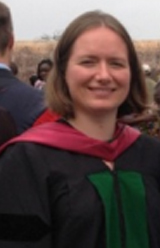 The 2015 recipient of the Academy's Artemis Award is Wendy Hofman, MD; nominated by Minnesota Academy of Ophthalmology. Dr. Hofman was nominated for her dedication to serving the needs of the poor and underserved. She has done so while sacrificing the lifestyle that most of us (and our families) take for granted. From the time she completed her residency, her eyes and heart have been in serving, educating, and leading ophthalmology care in Gabon, West Africa.
The 2015 recipient of the Academy's Artemis Award is Wendy Hofman, MD; nominated by Minnesota Academy of Ophthalmology. Dr. Hofman was nominated for her dedication to serving the needs of the poor and underserved. She has done so while sacrificing the lifestyle that most of us (and our families) take for granted. From the time she completed her residency, her eyes and heart have been in serving, educating, and leading ophthalmology care in Gabon, West Africa.
Soon after finishing ophthalmology residency in 2008 at the University of Minnesota, Dr. Hofman and her husband, Eric, went to French language school in Switzerland for 5 months. She then served on Mercy Ships in Benin while she did a three-month "International Cataract Surgery Fellowship" to learn MSICS. Dr. Hofman then traveled to Bongolo Hospital in Gabon, Africa and has since served as the hospital ophthalmologist. Her husband, Eric, works in hospital bookkeeping. Before Dr. Hofman's arrival, Bongolo had never had an ophthalmologist. She had to build an eye clinic from the ground up.
In Gabon West Africa, which has a population of 1.5 million people and is roughly the size of Colorado, there are approximately 25 ophthalmologists. These African eye care providers primarily live in the large city of Libreville. Bongolo is located in the rural interior of the country, 350 miles from Libreville. The vision of the hospital has been to serve an unreached population. However, more than half of their patients come from Libreville and many of them travel two-three days for care. Dr. Hofman and her team currently perform approximately 70 percent of Gabon's annual cataract surgeries (Almost 6000 patient visits and 450-650 cataract surgeries per year). Dr. Hofman often sees patients who have been bilaterally blind for years due to cataract, and when they finally have the money to pay for taxi fare and find someone to accompany them, they find their way to Dr. Hofman. Her cataract surgeries are usually booked four-nine months in advance, although it has been as long as a year at times. She also performs many trabeculectomies with MMC, removes pterygiums, performs eviscerations or enucleations, and does lid surgeries and strabismus surgeries.
Dr. Hofman started the only ophthalmology residency program in Gabon. Her training program is not yet accredited by the Gabonese government, despite years of trying to get through the red tape. Dr. Hofman's residency program is three-year long and she just graduated her first resident in June 2014. Her second ophthalmology resident began training at Bongolo Hospital in October 2014. As part of this residency program, Dr. Hofman brought in six different visiting ophthalmologists for two-seven weeks rotations. Under Dr. Hofman's guidance, the resident performed 1000 surgeries as primary surgeon, including 800 cataract surgeries. Dr. Hofman has also been training an ophthalmic nurse and the two nurse's aides in French. She has educated five or six national ophthalmologists MSICS and is an Adjunct Associate Professor in the Department of Ophthalmology at the University of Minnesota.
Dr. Hofman strives to for quality care and is building a registry to assess cataract outcomes. Each patient is refracted postop and Dr. Hofman has recently built a simple optical department where her team makes their own glasses. Dr. Hofman's leadership and "can do" spirit has helped build her clinic's capacity. It now runs with four slit lamps, three operating microscopes (two Zeiss), one combo YAG/SLT, two AK/AR's, one A-scan/biometry, one B scan, one HVF, one autoclave, loose lenses and trial frames, one phoropter, one Tonopen, applanation tonometry, and two working Diplomaxes (one does anterior vitrectomy). The hospital was also awarded a $600,000 grant from USAID’s ASHA (American Schools and Hospitals Abroad) program to construct a larger eye clinic building. Dr. Hofman anticipates construction will begin at the end of 2015.
One of Dr. Hofman’s most rewarding experiences is seeing the proud smile on her resident’s face when he completed his first MSICS case by himself or seeing her resident’s patients’ happiness after surgery, knowing there is a legacy being created that will continue even when she is gone.